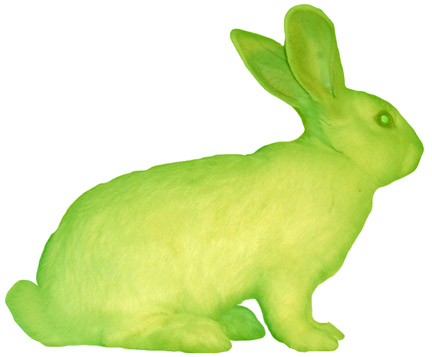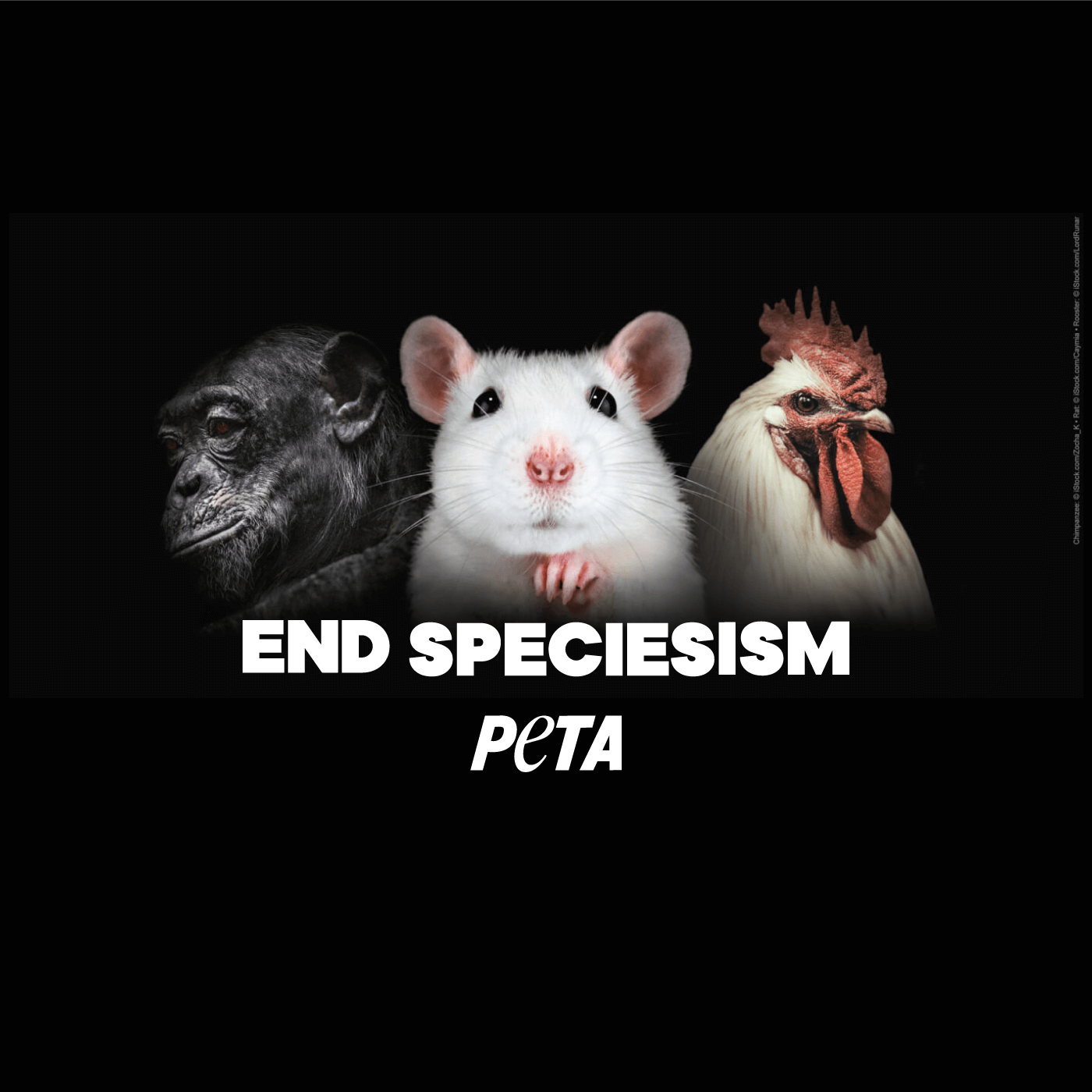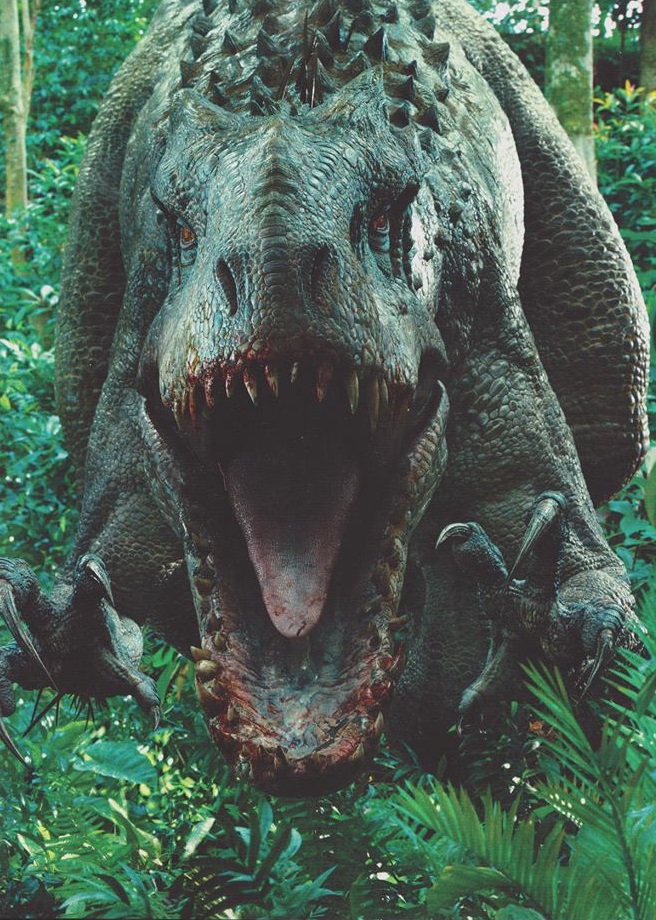In Eduardo Kac's
experiment, known as the GFP Bunny or "Alba", Alba was subjected to
"zygote microinjection" in which a "fluorescent protein from a
species of fluorescent jellyfish...was inserted into fertilized rabbit egg
cells"(Vesna). In a similar vein, rats were also subjected to this
experiment, but for research purposes, with scientists “tagging” certain
proteins with the fluorescent genes allowing them to monitor the “effectiveness
of potential drugs without using surgery” (Vesna). However, while these two
tamperings of nature are identical in procedures, some feel that Kac’s
experiment, or “transgenic art” as he calls it, to be “needless and abusive
manipulation of an animal”, and I can’t help but agree with the animal rights
activitists here (Vesna).
 |
| Figure 1 - Alba, the glow-in-the-dark Bunny http://www.ekac.org/albagreen.jpeg |
In GFP BUNNY, Eduardo Kac explains that the whole point of his
“invention of transgenic social subjects” or “transgenic art” is the “process
of creating the bunny, bringing her to society at large, and providing her with
a loving…environment in which she can grow safe and healthy” (Kac). While
organizations like PETA claim animals shouldn’t be used for experimentation
because they “languish in pain, ache with loneliness, and long to roam free and
use their minds”, it is apparent that Kac loved Alba and treated her with the
utmost care, but still after all his explanation, I don’t see much of a reason
to be messing around with nature in this sense. I can fully understand doing so
for research purposes like curing cancer, but I feel this “transgenic art” is
crossing a line that should only be crossed for real advantageous purposes for
mankind.
 |
| Figure 2 - PETA (People for the Ethical Treatment of Animals) Logo http://www.peta.org/wp-content/uploads/2013/06/PETA-Facebook-Logo.jpg |
It is interesting to note that people
like Kac who tinker with nature for the sake of their own creativty have been a
key focus for Hollywood movies lately. The upcoming Jurassic World movie is the classic tale of humans playing God
trying to “outwit nature in the name of the almighty dollar”. Movies like these
touch on the idea that humans going too far with genetic manipulation resulting
in catastrophe, and while they are just science-fiction right now, it seems all
too possible that these ideas may be entering the realm of reality in the near
future. Ultimately, I believe that human creativty should be limited by ethical
standards; one can’t go around experimenting on humans for example, just
because it piques his/her interest.
 |
| Figure 3 - Indominus Rex from Jurassic World http://img1.wikia.nocookie.net/__cb20150428024203/jurassicpark/images/c/c2/Indominusempire.jpg |
Citations
- 5 Bioart Pt1 1280x720. Perf. Victoria Vesna. N.p., 18 Sept. 2013. Web. 10 May 2015. <https://www.youtube.com/watch?t=718&v=PaThVnA1kyg>.
- "Animals Used for Experimentation." PETA. N.p., n.d. Web. 10 May 2015. <http://www.peta.org/issues/animals-used-for-experimentation/>.
- "GFP BUNNY." GFP BUNNY. Dobrila, Peter T. and Kostic, Aleksandra (eds.), 2000. Web. 10 May 2015. <http://www.ekac.org/gfpbunny.html#gfpbunnyanchor>.
- Hoffman, R. "Green Fluorescent Protein Imaging of Tumour Growth, Metastasis, and Angiogenesis in Mouse Models." National Center for Biotechnology Information. U.S. National Library of Medicine, Sept. 2002. Web. 10 May 2015. <http://www.ncbi.nlm.nih.gov/pubmed/12217792>.
- Stack, Tim. "'Jurassic World': EW Preview." Entertainment Weekly's EW.com. N.p., 08 Apr. 2015. Web. 11 May 2015. <http://www.ew.com/article/2015/04/08/jurassic-world-ew-preview>.
Hi Matt!
ReplyDeleteI really like that your blog post is specifically focused on biotechnological application on animal subjects, and brings up the question of how valid genetic manipulation is in art? While your opinion that animal testing/modification with no immediate positive aim (such as curing cancer) is wasteful, in terms of animal life and scientific energy, is shared by a large portion of society, I believe there is an under-the-surface reason for the actual necessity of this science/art cross-section. While the GFP bunny itself may have not directly contributed to future applications of green fluorescent proteins in biomarkers/visualization of gene insertion in vivo, it's prominence in art culture led to prominence in general knowledge, allowing the wider application of the specific procedure. This procedure, when applied to things like tagging genetically modified white blood cells in the attempt to target cancer cells more effectively with the immune system, ends up being highly significant in terms of the bettermant of society. Even broader as well, I believe that this specific example can be applied to most "seemingly frivolous" uses of technology for modern art.
Best,
Jing Gong
Hi Matthew,
ReplyDeleteI thoroughly enjoyed your post about the intersection of biotechnology and art. I definitely agree with you in terms of the ethics of such work-- it is difficult to find the fine line between what is productive and what is inappropriate. Your example of the upcoming movie Jurassic World was especially relevant. We are entering an age where biotechnology holds very important significance in how we approach nature. It can go both ways-- either beneficial in reversing the damage of industrialism and modernization, or it can create horrors that might be irreversible.
Best,
Brenda
Matt,
ReplyDeleteI thought you touched on a very interesting point about on how controversial biotechnological and art can be. While this wasn't directly associated with art, in my post I talked about Dolly, who was the first successfully cloned sheep. Similarly to Alba, this sparked anger in a few people seeing this act as "unholy". I think it will be very interesting to see if these people will change their opinion over time.
Have a good one!
Rob Tom